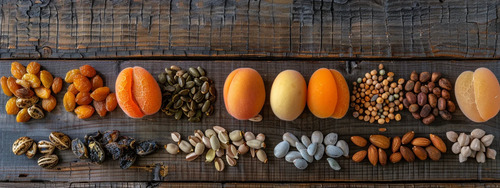Apricot seeds, often overshadowed by the vibrant fruit they’re encased within, are garnering interest for their nutritional properties and potential health benefits. Packed with vitamins, minerals, and compounds that might influence our well-being, these seeds are a subject of ongoing research and discussion. Despite the controversies surrounding their use, it’s undeniable that they hold a unique place in the world of natural health. Below, we delve into the intricacies of apricot seeds and what makes them a topic of such vigorous debate and interest.
Antioxidant Properties of Apricot Seeds in Daily Diet
Antioxidants are key players in protecting our bodies against oxidative stress, and apricot seeds are a natural source of these protective compounds. They contain vitamin E and other antioxidant phytochemicals that help combat the damaging effects of free radicals. Including natural sources of antioxidants in one’s diet is generally considered to boost overall health and disease resistance.
Moreover, the inclusion of apricot seeds as a part of daily nutrient intake could potentially offer added defense against environmental and lifestyle stressors. Their rich antioxidant profile supports the body’s own mechanisms for repairing and preventing cellular damage, thereby potentially reducing the risk of inflammation and chronic diseases.
For individuals looking to enhance their diet with natural sources of antioxidants, apricot seeds can be a viable option. The key is incorporating them mindfully, ensuring that the overall diet remains balanced and diverse to provide a broad spectrum of nutrients and protective compounds.
Apricot Seeds and Heart Health: What Research Suggests
The potential benefits of apricot seeds may extend to heart health due to their unsaturated fat content. These heart-healthy fats, particularly linoleic acid, which is an omega-6 fatty acid, can support the maintenance of normal blood cholesterol levels. The fiber content in the seeds also contributes to cardiovascular health by aiding in the reduction of overall cholesterol in the body.
Furthermore, antioxidants like vitamin E found in apricot seeds can help prevent atherosclerosis, a common cardiovascular condition where arteries become narrowed due to plaque buildup. Free radicals contribute to this process, and antioxidants neutralize these harmful molecules, thereby protecting heart health. Regular consumption of foods with antioxidants, including apricot seeds, is beneficial for heart health.
It is essential, however, to approach the heart health claims of apricot seeds with caution, particularly considering their amygdalin content. While the beneficial aspects for heart health are intriguing, it is equally important to consider their use alongside established heart-healthy practices like a balanced diet and regular exercise.
Exploring the Nutritional Profile of Apricot Seeds
Apricot seeds, also known as kernels, are rich in nutrients including protein, dietary fiber, and unsaturated fats, which are beneficial for maintaining a healthy diet. They also contain essential minerals like potassium, magnesium, and iron which are vital for various bodily functions. The presence of these nutrients suggests that apricot seeds can play a role in a well-rounded diet.
Aside from the minerals, the kernels are a source of vitamins, particularly vitamin E, known for its antioxidant properties. This helps protect the body’s cells from damage caused by free radicals, potentially reducing the risk of chronic diseases. Furthermore, the seeds hold other phytonutrients that could enhance their health-promoting profile.
The variety in apricot seed forms, such as raw, roasted, or as bitter apricot seed capsules, offers an accessible way for consumers to include them in their diets. This flexibility in consumption allows individuals to choose how to best integrate the potential benefits of apricot seeds into their health routine, acknowledging personal tastes and preferences.
Adding Apricot Seeds to Your Diet: Safely Reaping the Benefits
When considering integrating apricot seeds into your diet, it’s crucial to understand how to do so safely. Given the potential risks associated with amygdalin, moderation is the key. Start with small amounts and see how your body responds, taking care to avoid exceeding recommended doses to steer clear of adverse effects.
For those interested in exploring the supposed benefits of apricot seeds without the concern of preparing them manually, encapsulated forms such as bitter apricot seed capsules provide a measured and accessible option. They simplify dosage control and ensure that individuals can consume apricot seeds in a consistent and manageable way.
Overall, while apricot seeds may offer some intriguing health benefits, a careful and informed approach is essential when incorporating them into one’s diet. Remaining educated on the latest research and adhering to recommended guidelines are indispensable practices for anyone looking to harness the nutritional power of apricot seeds without compromising safety.
